Health Equity
News
Penn Medicine Co-Sponsored Town Hall Targets Vaccine Hesitancy in Communities of Color
University Joins with Black Clergy of Philadelphia and the COVID-19 Prevention Network
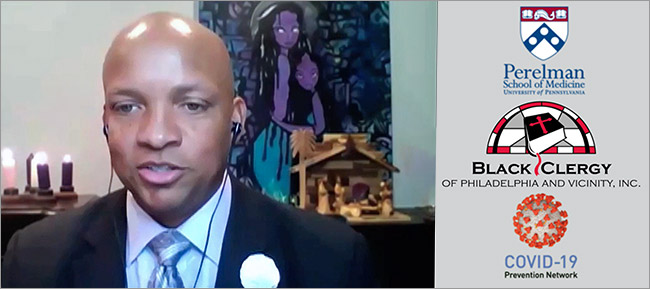
“These are Dickensian-like times, with the best and the worst — vaccine and pandemic — occurring simultaneously,” said Southwest Philadelphia’s Rev. Cean James as he opened the Faith, (Mis)Trust and COVID-19 virtual town hall aimed at addressing vaccine hesitancy in minority communities.
“These are the darkest days of the pandemic as more than 3,000 individuals have died daily during the last week. There is perhaps no one among us who does not know several people touched by COVID. But we also have a ray of hope as the first injections of Pfizer’s vaccine are being administered to health care workers.”
The December 15 national virtual town hall was the second in a series co-sponsored by the University of Pennsylvania Perelman School of Medicine, Black Clergy of Philadelphia and Vicinity, Inc., and the National Institute of Allergy and Infectious Disease (NIAID) at the National Institutes of Health’s COVID-19 Prevention Network (CoVPN). Recent survey data show that only 42% of African Americans intend to get the COVID-19 vaccine.
On stage in the virtual town hall were three Philadelphia religious leaders, two ambassadors from the NIH COVID-19 Prevention Network from New York and Washington, D.C., two physicians from the University of Pennsylvania, and Congressman Dwight Evans (D-PA), who sits on the Ways and Means Subcommittee on Health.
We cannot, as religious leaders, blindly make statements that discourage people from doing what is in their best interest.
Imam Quaiser Abdullah
The results of Thanksgiving gatherings have caught up to us,” continued James, who is Senior Pastor of the Salt and Light Church, and Executive Director of the CityLights Network. “Hospitals are overrun and beds are crowded; doctors and first line workers are overwhelmed. But in many communities there is a lot of vaccine skepticism for many reasons — some, historical; some, reasons of faith; and some, political. Many individuals have made it very clear that as of right now, they are not planning to take the vaccine.”
“Our gathering this evening,” said James,” is designed to bring some awareness and understanding through a conversation with political leaders, medical field leaders, and faith community leaders to talk about COVID-19 itself and what is being done to ensure an equitable distribution of this vaccine.”
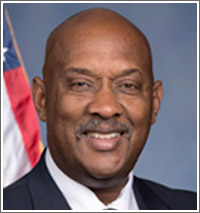
James asked Congressman Evans if he and the Ways and Means Subcommittee on Health were aware of street talk and community concern that the non-mRNA vaccines coming out after Pfizer and Moderna’s were likely to be “cheaper and less effective” and may ultimately be the ones made available to the African American community.
The Congressman said yes, he was aware of that street talk, and emphasized that “I’ve been listening and it’s very important to listen first and then attempt to address various concerns and questions that people have. We have a long way to go to deal with the mistrust. I mean, that’s embedded there. By participating in events like this town hall today, we can start to chip away.”
Providing a medical overview of COVID-19 was Florence Momplaisir, MD, MSHP, Assistant Professor in the Infectious Disease Division of Penn’s Perelman School of Medicine.
Facilitating informed decisionmaking
“The goal for the session today is not to convince anyone to take the vaccine. It’s to provide information to help you make an informed decision around taking the vaccine,” said LDI Senior Fellow Momplaisir, who worked closely with the COVID-19 clinical trial teams, co-leading community engagement efforts to increase racial diversity.
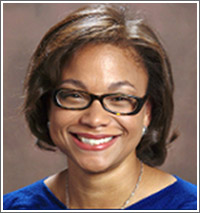
Momplaisir explained that about 20% of infected people have no symptoms. Children are more likely to be asymptomatic than adults. After exposure to an infected person, it takes about five days for symptoms to appear: fever, cough, fatigue, muscle aches, diarrhea, and loss of taste or smell. In the majority of cases, those symptoms are mild and last a couple of days. But in 40% of cases, patients develop more severe symptoms about seven days later. About 14% develop symptoms so severe they need hospitalization. Five percent become critically ill and need to be supported in the ICU with a ventilator and other measures. The overall volume of infections in this pandemic is very high, so a lot of people end up in this very severe state. The public health goal is to keep people healthy and prevent them from ultimately being hospitalized.
Half the people hospitalized
“We share the largest burden of disease and we are more likely to be hospitalized with severe illness,” Momplaisir told the audience. “The latest statistics out of the Philadelphia Health Department show that half the people hospitalized in the city with COVID-19 are Black and half of those dying of the disease are also Black. These numbers are much, much higher compared to any other racial or ethnic group. Obviously, we share a high burden of comorbid conditions like heart disease, et cetera, but factors like structural racism and other barriers also contribute to this.”
“During the last town hall,” Momplaisir continued, “we discussed different mitigation measures, such as the importance of wearing masks and social distancing. Tonight, I’m focusing on the vaccine and the individual benefit it conveys. The goal is to prevent severity of illness so that people do not go to the hospital and don’t end up in the ICU. And, in addition, the vaccine has a community benefit because as a community, we are less likely to have the infection and less likely to transmit it to others.”
African American vaccine scientists
She went on to emphasize the role of racial minorities in the vaccine development efforts. “African Americans have been involved in major steps of the scientific work,” Momplaisir said. “One of those is Dr. Kizzmekia Corbett, a viral immunologist in the Vaccine Research Center of NIH and one of the leading experts in mRNA vaccines. She works closely with Dr. Fauci. There have been people of color in the clinical trials, which is very encouraging. Thirty percent of the people enrolled in the Moderna trial were non-white individuals. Forty-two percent of the people enrolled in the Pfizer trials, which were conducted around the world, were also from diverse backgrounds.”
“In addition,” Momplaisir said, “the National Medical Association is the country’s oldest and largest association of black physicians. It created a task force around COVID-19 vaccine, and has been serving as a bridge between the scientific community and the community at large.”
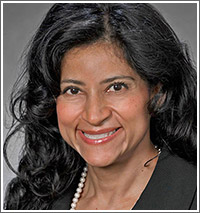
A top question from the audience was whether a person who had been infected and recovered from the virus should get the vaccine. Momplaisir and Penn colleague Carmen Guerra, MD, MSCE, and Associate Professor of Medicine at the Perelman School, said yes. They explained there is still much unknown about how long the antibodies last; the latest studies suggest the levels of antibody protection produced by the vaccine are 400% higher than the levels left behind in the wake of a natural infection.
LDI Senior Fellow Guerra went on to address the audience concern that the “Warp Speed” development of the vaccine occurred so fast that essential parts of the testing and safety verification process might have been skipped.
Ten years in the making
“There was a big gamble at the front end when both the clinical trials and the actual manufacture of the vaccine began simultaneously,” said Guerra, who is also Vice Chair of Diversity and Inclusion in the Perelman School of Medicine’s Department of Medicine. “But, as we’ve now seen, the data later showed the vaccine to be effective and then, the drug began shipping immediately. There was a lot of confidence based on the advice of scientists like Dr. Fauci and other experts at NIH. A key point is that the actual work on mRNA vaccine technology had been underway for ten years and there was already strong science around it.”
A major goal of the town hall program was to provide a frank forum that would help identify and address the many false claims and rumors ricocheting around minority communities since the outbreak of the pandemic.
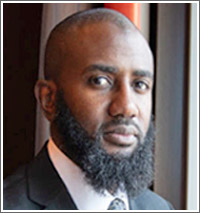
“Based on the information we’ve heard tonight, I would say I know that the vaccine has met a certain rigor related to the needs of the community,” said panelist Quaiser Abdullah, PhD, Assistant Professor in Temple University’s Klein College of Media and Communications, and an Imam at Philadelphia’s Masjid Quba. “But, there’s a lot of disparate information coming out of religious communities right now. The previously mentioned level of mistrust is fueling some of that, particularly on social media. And it’s coming, unfortunately, from people of repute in the community.”
First point of contact
“I think,” continued Abdullah, “we have a right, with good justification, to express real skepticism and I think there’s a need to acknowledge that. But religious leaders in many cases, are the first point of contact for people who want guidance. We cannot, as religious leaders, blindly make statements that discourage people from doing what is in their best interest.”
Panelist Rev. Dr. Donna Jones, Founding Pastor of the Cookman Beloved Community Baptist Church in West Philadelphia, agreed. “Knowing the facts is an important part of ministering to people,” she said. “Early in the discussions of the COVID-19 vaccine, some in the Christian community were concerned that fetal tissue might be involved in the vaccine production process. Or, my Jehovah Witness friends were concerned about blood.”
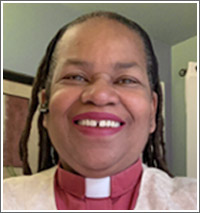
“It’s to our advantage,” Jones continued, “to really not only stay with what our particular denomination or community is teaching, but also to look at the larger community within our faith because our people can get mixed signals. If we know that some people are being told there are fetal cells or other things out there, then we can better be that chaplain who addresses and dispels some things.”
Trusted sources of facts
Jones also noted that the websites of the Centers for Disease Control and Prevention (CDC) and World Health Organization (WHO) contained the latest facts about all aspects of the virus and the vaccines. She also suggested that religious and community leaders explore the various fact-check sites that help point out claims or assumptions about the virus or the vaccines that are wrong or distorted.
CoVPN faith ambassador and Executive Director of Reaching All HIV+ Muslims in America (RAHMA) Khadijah Abdullah said the goal of the COVID Prevention Network was “to really engage with communities and discuss COVID-19 prevention methods, education, awareness and mistrust. We need to find a common ground on how we can survive this pandemic, learn about what’s going on in our communities and follow CDC guidelines to keep ourselves safe and alive.”
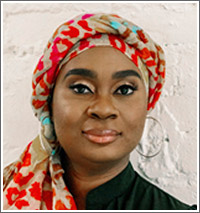
The other CoVPN faith ambassador, Rev. Bertram Johnson, chaplain at the Union Theological Seminary in New York, noted that CoVPN was a national effort working with 72 research sites across the country focused on COVID-19 prevention.
Disease, fear, and stress
“I have years of experience working with people living with HIV, and I’ve come to understand through the course of my career how important faith communities are in addressing issues of disease, fear, and stress in our communities. So, we’re grateful to partner with the University of Pennsylvania and the Black Clergy of Philadelphia. Khadijah and I come to this town hall not as experts, but as people who are community members whose lives are impacted by the virus.”
Johnson noted that one of the town hall’s missions is to direct community leaders and members toward sources of authoritative coronavirus information. He said many state health departments and large city health departments have websites designed to help the public understand the issues and vaccination locations.
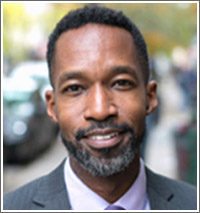
Direct contact
He also suggested that local community leaders could contact him or fellow CoVPN ambassador Khadijah Abdullah directly with questions: Bertram@justiceassociates.org or khadijah@haverahma.org.
In ending the town hall, moderator James cited the stream of questions that continued to flow, saying additional town halls would be organized to answer the questions and continue the conversation “for as long as necessary.”
“As we conclude this incredible hour of information,” said James, “our prayers go out for all the affected families and communities; for those who are in hospitals, for those who are on ventilators. I know that we all have a name that we could call right now. So, to whomever and however you pray, please, let’s keep our communities in our prayers right now.”